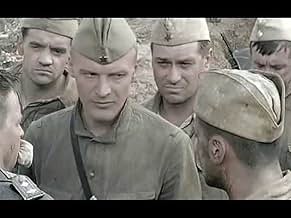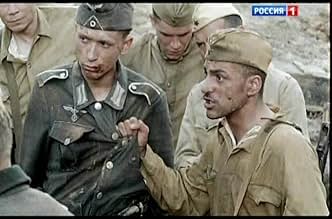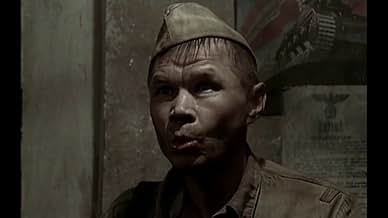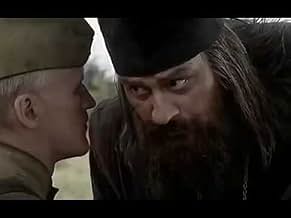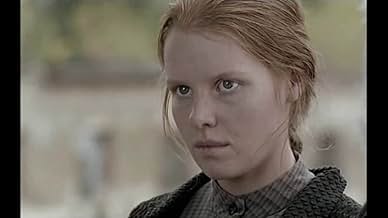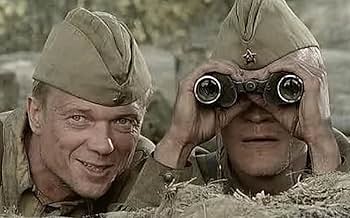Shtrafbat
- TV Series
- 2004
- 9h 10m
IMDb RATING
7.3/10
1.6K
YOUR RATING
Drama of the penalty parts of political prisoners, who fought on the Soviet fronts.Drama of the penalty parts of political prisoners, who fought on the Soviet fronts.Drama of the penalty parts of political prisoners, who fought on the Soviet fronts.
- Awards
- 2 nominations total
Browse episodes
Featured reviews
Shtrafbat is the story only Russians could tell about the Second World War. The largest front of the whole conflict has been, ironically, the least appearing subject on the silver screen after the war. While the Western Allies war-effort has been pictured in almost every possible detail and manner, the East has been left out or the job has been left to only some old propaganda movies of little else than historical footage value.
There is no chance that Shtrafbat could compete with Band of Brothers in every detail but neither you want to look at the screen with examining petty visual effects in mind. That the soldiers are Russians is enough big reason to forgive the less eye-captivating battle scenes and you can concentrate on the story that is the most interesting. So much different was the war in the Eastern front, and the nature of the Russian army, that you might wish people to produce more dramatizations from the other fronts, and of armies.
Shtrafbat is no way perfect, but it has some rare specialties that augment the overall rating. It tends to crush myths people have about the Second World War, the true heroes were Russian people and not their leaders who sent them to missions where they could only perish. Another great myth bust is that it presents the enemy, who does not pick up his gun, as an equal human being - an advancement that has been difficult to try in many acclaimed films as well. Shtrafbat shows how the war in the eastern front was a war of survival and how the clash of the -isms grinds people into dust.
There is no chance that Shtrafbat could compete with Band of Brothers in every detail but neither you want to look at the screen with examining petty visual effects in mind. That the soldiers are Russians is enough big reason to forgive the less eye-captivating battle scenes and you can concentrate on the story that is the most interesting. So much different was the war in the Eastern front, and the nature of the Russian army, that you might wish people to produce more dramatizations from the other fronts, and of armies.
Shtrafbat is no way perfect, but it has some rare specialties that augment the overall rating. It tends to crush myths people have about the Second World War, the true heroes were Russian people and not their leaders who sent them to missions where they could only perish. Another great myth bust is that it presents the enemy, who does not pick up his gun, as an equal human being - an advancement that has been difficult to try in many acclaimed films as well. Shtrafbat shows how the war in the eastern front was a war of survival and how the clash of the -isms grinds people into dust.
Shtrafbat is the story of a Soviet penal battalion at the height of the Second World War. The film follows the characters from the formation of the battalion in the prison yard to its complete decimation in combat against the Germans.
The film is a good introduction to the complexities of the Soviet war effort, covering the various motivations the characters have for signing up and the callous attitude of the military towards these people as well as giving a good idea of what an absolute hell the Eastern Front was.
The premise and the acting are generally good, but the story seems to move along in fits due to a mediocre directorial effort on the part of Dostal'. Perhaps he was unfamiliar with the mini-series format or just short on time, I don't know, but on the whole the film seems rather artificial and constructed. Segue contrast with "Seventeen Moments of Spring" and "Shield and Sword". Oh Well.
Shtrafbat could have been a whole lot better. Certainly. It is nonetheless worth watching for the history and (if for nothing else) the excellent final scene.
The film is a good introduction to the complexities of the Soviet war effort, covering the various motivations the characters have for signing up and the callous attitude of the military towards these people as well as giving a good idea of what an absolute hell the Eastern Front was.
The premise and the acting are generally good, but the story seems to move along in fits due to a mediocre directorial effort on the part of Dostal'. Perhaps he was unfamiliar with the mini-series format or just short on time, I don't know, but on the whole the film seems rather artificial and constructed. Segue contrast with "Seventeen Moments of Spring" and "Shield and Sword". Oh Well.
Shtrafbat could have been a whole lot better. Certainly. It is nonetheless worth watching for the history and (if for nothing else) the excellent final scene.
With the war not going well for the Soviet Union, Stalin accepted volunteers from the prisons and used the prisoners as shock troops. This is the story of one such battalion. There are petty crooks, political prisoners, soldiers kicked out of other units, gray-haired veterans of the White Army plus some dangerous criminals.
They are thrown into battle ill-equipped, untrained and face the threat of the NKVD if they show signs of cowardice or failure.
The special effects are rudimentary and many of the minor characters are one-dimensional, but the overall story is very human and riveting.
I have not seen a version with subtitles or dubbing. Viewing the show required liberal use of the pause button and explanations from a native speaker of Russian.
They are thrown into battle ill-equipped, untrained and face the threat of the NKVD if they show signs of cowardice or failure.
The special effects are rudimentary and many of the minor characters are one-dimensional, but the overall story is very human and riveting.
I have not seen a version with subtitles or dubbing. Viewing the show required liberal use of the pause button and explanations from a native speaker of Russian.
If you're looking for a war series that doesn't just depict battles but truly captures the human cost of war, Strafbat (Penal Battalion) is an absolute must-watch. This 2004 Russian TV series is a brutal, gripping, and deeply emotional portrayal of Soviet penal battalions during World War II-units made up of former prisoners and disgraced soldiers sent on near-suicidal missions to redeem themselves through combat.
Authenticity and Realism One of Strafbat's biggest strengths is its raw realism. Unlike many war dramas that glorify heroism, this series strips war down to its harshest truths-desperation, sacrifice, and the thin line between survival and honor. The production design is immersive, with detailed period-accurate uniforms, weaponry, and locations that make you feel like you're right there in the trenches.
Complex Characters and Morality What sets Strafbat apart is its incredible character depth. The soldiers in the penal battalion aren't your typical heroes-they are criminals, deserters, and men who have lost everything. Yet, as the series progresses, you begin to understand their humanity, their motivations, and the impossible choices they face. Alexey Serebryakov delivers a powerhouse performance as Major Tverdokhlebov, a commander trying to lead men who have been given no hope. His moral struggle, combined with the way the penal battalion members evolve, adds layers of emotional weight to every scene.
A Story of Redemption and Brotherhood Despite its bleak premise, Strafbat isn't just about suffering-it's also about resilience, redemption, and the unbreakable bond between soldiers. These men, who start off as outcasts, form a brotherhood forged in fire. Their camaraderie, defiance, and small victories make their journey deeply compelling.
Cinematic Storytelling From its intense battle sequences to its quieter, character-driven moments, Strafbat is beautifully shot and directed. The cinematography captures both the chaos of war and the haunting stillness in between, while the soundtrack adds to the emotional depth without being overbearing.
Why You Should Watch It If you're a fan of historical dramas that don't shy away from the grim realities of war (Band of Brothers, Come and See, Generation War), Strafbat is a hidden gem. It's an emotionally powerful, thought-provoking series that stays with you long after the final episode. More than just a war story, it's a testament to the strength of the human spirit in the face of impossible odds.
⭐ Final Verdict: 9.5/10 - An absolute masterpiece of war television, blending historical accuracy with raw emotional storytelling. Highly recommended!
Authenticity and Realism One of Strafbat's biggest strengths is its raw realism. Unlike many war dramas that glorify heroism, this series strips war down to its harshest truths-desperation, sacrifice, and the thin line between survival and honor. The production design is immersive, with detailed period-accurate uniforms, weaponry, and locations that make you feel like you're right there in the trenches.
Complex Characters and Morality What sets Strafbat apart is its incredible character depth. The soldiers in the penal battalion aren't your typical heroes-they are criminals, deserters, and men who have lost everything. Yet, as the series progresses, you begin to understand their humanity, their motivations, and the impossible choices they face. Alexey Serebryakov delivers a powerhouse performance as Major Tverdokhlebov, a commander trying to lead men who have been given no hope. His moral struggle, combined with the way the penal battalion members evolve, adds layers of emotional weight to every scene.
A Story of Redemption and Brotherhood Despite its bleak premise, Strafbat isn't just about suffering-it's also about resilience, redemption, and the unbreakable bond between soldiers. These men, who start off as outcasts, form a brotherhood forged in fire. Their camaraderie, defiance, and small victories make their journey deeply compelling.
Cinematic Storytelling From its intense battle sequences to its quieter, character-driven moments, Strafbat is beautifully shot and directed. The cinematography captures both the chaos of war and the haunting stillness in between, while the soundtrack adds to the emotional depth without being overbearing.
Why You Should Watch It If you're a fan of historical dramas that don't shy away from the grim realities of war (Band of Brothers, Come and See, Generation War), Strafbat is a hidden gem. It's an emotionally powerful, thought-provoking series that stays with you long after the final episode. More than just a war story, it's a testament to the strength of the human spirit in the face of impossible odds.
⭐ Final Verdict: 9.5/10 - An absolute masterpiece of war television, blending historical accuracy with raw emotional storytelling. Highly recommended!
"Shtrafbat" (2004), an 11-part TV series, is about Soviet Army battalions made up of many kinds of prisoners, hoping to be "rehabilitated" of their "crimes".
"Shtrafbat" (Punishment or Penal Battalions) were made up of deserters, political prisoners, and former POWs who had returned from German captivity (according to Stalin: allowing ones-self to be captured alive & imprisoned was akin to surrendering, & surrendering was considered to be treason, a crime punishable by death), and even "regular" criminals sent from prison-camps, so the suspicion that these people wouldn't fight well, or might even surrender, was high. These "criminals" were "graciously" allowed "a second chance" by the government, a chance to "wash away their past sins with their own blood."
These "Shtrafbat" were sent on the most dangerous and difficult missions (i.e. those with low survivability) and were followed into battle by troops who were called "Zagrad-Otryad" (Blocking Troops), and were under NKVD (precursor to the KGB) control. Sometimes these troops were almost as large as the actually fighting units they blocked. They were under orders to shoot any Soviet soldiers who were thought to be retreating, be they wounded or not.
The few "Shtrafbat" soldiers who lived through it for some months, were considered rehabilitated and returned to regular army units. The KIAs were rehabilitated posthumously, sparing their families from being branded as families of traitors, "enemies of the Soviet people."
"Shtrafbat" (Punishment or Penal Battalions) were made up of deserters, political prisoners, and former POWs who had returned from German captivity (according to Stalin: allowing ones-self to be captured alive & imprisoned was akin to surrendering, & surrendering was considered to be treason, a crime punishable by death), and even "regular" criminals sent from prison-camps, so the suspicion that these people wouldn't fight well, or might even surrender, was high. These "criminals" were "graciously" allowed "a second chance" by the government, a chance to "wash away their past sins with their own blood."
These "Shtrafbat" were sent on the most dangerous and difficult missions (i.e. those with low survivability) and were followed into battle by troops who were called "Zagrad-Otryad" (Blocking Troops), and were under NKVD (precursor to the KGB) control. Sometimes these troops were almost as large as the actually fighting units they blocked. They were under orders to shoot any Soviet soldiers who were thought to be retreating, be they wounded or not.
The few "Shtrafbat" soldiers who lived through it for some months, were considered rehabilitated and returned to regular army units. The KIAs were rehabilitated posthumously, sparing their families from being branded as families of traitors, "enemies of the Soviet people."
Did you know
- ConnectionsReferenced in Comedy Club: Episode #1.13 (2005)
Details
- Release date
- Country of origin
- Language
- Also known as
- The Penal Battalion
- Production companies
- See more company credits at IMDbPro
- Runtime
- 9h 10m(550 min)
- Color
Contribute to this page
Suggest an edit or add missing content

